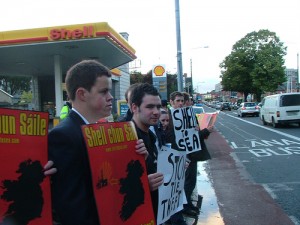Ireland: Shell's new Nigeria?


In the public furore that followed after five farmers were jailed in 2005 for contempt of court for refusing to allow Shell access their lands it seemed as if things had finally reached a turning point for the better. This from Shell's 2005 sustainability report:
But then last month one of the five, Willie Corduff, alleges he was assaulted by members of the private security service protecting Shell's operations after disrupting the construction of fences near where the gas pipeline is planned to make landfall. The exact circumstances of what happened are in dispute but Nobel Peace Prize winner Archbishop Desmond Tutu has released a particularly strong statement:
A peaceful protester, Goldman International Environmental Award Winner Mr. Willie Corduff has been physically attacked, under cover of darkness, by the agents of a multinational corporation, resulting in his being hospitalised and left severely hurt and traumatised.
I am aware that the conflict centres around attempts by a consortium comprised of Shell, Statoil and Marathon to bring raw gas ashore in Erris, by means of a high-pressure pipeline running through the community, to a processing plant at Ballinaboy.
This is opposed by local people, particularly in the parish of Kilcommon where the project is based, because of fears for their health and safety (including possible contamination of their drinking water). A compromise proposed by three members of the Catholic clergy and supported by a majority of people in the locality, would have seen an onshore processing plant located in an unpopulated area away from the community’s water supply, eliminating the need for high pressure pipelines.
This proposed compromise has, unfortunately, been rejected by Shell and the lrish government. The strength of feeling in the community regarding this issue is illustrated by the fact that five people, who became known as the Rossport 5, spent 94 days in prison for their non-violent opposition to the project going ahead in its current form. Mr. Corduff, one of the Rossport 5, went on to win the prestigious Goldman international environmental award, known as the Green Nobel Prize, in 2005.
It is in regard to the attack on Mr. Corduff that I particularly wish to make my concerns known. Mr. Corduff is a small farmer who has lived all his life and raised his family in this area. His only interest and motivation is the protection of his family and the welfare of his community. His opposition to the gas project has always been entirety peacefuI and non-violent.
Then last week local fishing rights activist Pat O'Donnell, claimed armed 'mercenaries' came aboard his fishing trawler, the Iona Isle, and forcibly scuttled it before leaving on an inflatable. This incident led Shell to take the extraordinary step of issuing a press release to deny they had anything to do with the sinking of the Iona Isle:
It is reported that O'Donell has laid 800 crab pots along the intended route of the pipeline and he is one of the few local fishermen not to accept the €30,000 offered by Shell as compensation for disruption.
My Take: With claim for counter claim its hard to source the truth of these events but its very clear the relationship has broken down and things have taken a sinister turn.
The rush for energy resources can leave local communities at the point of extraction feeling like they bear much environmental cost and enjoy few of the economic benefits. The perceived sense of marginalisation can lead to much anger and this can be quickly brought to bear on the extraction company with the host government perhaps taking a convenient back seat to the problem.
Shell itself identified the problem in their 2005 report – simply ‘obeying the law and following the permitting process’ thereby ‘underestimating the intensity of opposition’ and the ‘impact on close knit communities’ can lead swiftly to project failure. It is surprising that Shell had not more fully institutionalized this learning from their Nigeria experience where the divergence between the national permitting process and the permission of the local community is surely likely to be much greater than it ever would be in Ireland. But recognizing the concerns of the community is one half of the stakeholder engagement problem. Being ready, willing and able to respond is the other half. It will always be difficult for a private sector actor to square that circle so corporate social responsibility cannot be a substitute for governmental social responsibility.
To be fair to Shell, they appear to be left in a no win situation due to a failure of national and local public governance. If energy independence is so important to Ireland then the politicians ought to step up and account fully for the policy trade off decision. Public protest & direct action at the point of operation is proof that the political process failed. The Irish government minister for Energy & Natural Resources now responsible for the project, Eamon Ryan, previously opposed it as a member of the Green Party then in opposition to the government. He even joined in public protest events back in 2005. In 2002 he said:
The real question which must be asked about this gas field project is this -- is the Royal Dutch Shell deal a good deal for Mayo, and a good deal for the Irish taxpayer?
Indeed.